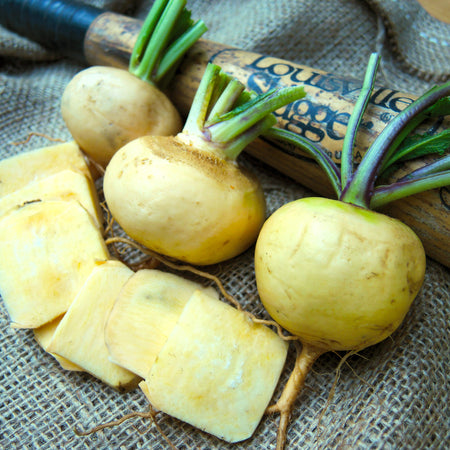45-65 days. Reminiscent of the summer sun, Golden Ball is truly an exceptional turnip. The 3–4 inch roots are perfectly-shaped amber globes that have delicate-grained, meaty flesh that’s never woody. The flavor is sweet, mellow and smooth. For an outstanding, lustrous dish, try them mashed with butter and shallots. The roots grow quickly and keep well.
Brassica rapa (turnips) & Brassica napus (rutabagas) These classic root crops can store long-term in the root cellar, or right in the ground for milder regions, providing winter fare with vitamins, minerals and antioxidants that boast a whole range of health benefits. The leafy tops are particularly loaded with carotenoids, B-complex vitamins, and vitamin K.
Days to maturity are calculated from date of direct seeding.
Culture
• Rutabagas and turnips can tolerate a range of soil types with a slightly acidic pH of 6.0-7.0
• Work in one cup of TSC's Complete fertilizer per 10 row feet
Direct Sowing
• Direct sow spring through summer
• Thin promptly when they form 2 true leaves
• Sow turnips July through early-September for a fall/winter crop
• Sow rutabagas in July for a fall/winter crop
Insects & Diseases
• Common insects: See Brassica Insect Information below
• Disease prevention: 5-7 year crop rotation
Harvest & Storage
• Roots are sweetest when small, so pick early
• Turnip greens can be picked when young
• Both root crops are best stored at 36°F and 95% relative humidity
What is seed tape?
Seed tapes are perfectly straight rows of precisely spaced crops. No more having to thin seedlings! This biodegradable tape will plant a row 5 meters (16 feet, 5 inches) long. Simply lay it in a furrow and cover with a light layer of sifted compost or soil, water and wait. Save yourself a heap of planting time with these popular vegetable and herb staples.
Brassica Insect Information
Aphids: Control aphids with ladybugs or a hard spray of water or Pyrethrin. Also, select varieties that mature later in the season when aphid populations decline.
Cabbage worms, loopers, and root maggots: The first sign of cabbage worms will be off-white butterflies fluttering near the plants. They lay their yellowish-colored eggs on the undersides of leaves, which hatch into caterpillars that can cause severe root and head damage. To control light infestations, spray plants with Bacillus thuringiensis (B.t.). For heavy infestations, bait cabbage worms by mixing wheat bran into a B.t. solution. Add 1 tablespoon of molasses. Broadcast the bran mixture around the base of plants. Reapply as necessary. Using Reemay or Summer Insect Barrier can also provide control.
Flea beetles: Flea beetles chew tiny pinholes in leaves. Early control is essential to minimize the damage. Spray infected plants with Pyrethrin. Using floating row covers such as Summer Insect Barrier can also provide control.
Symphylans: In some areas of the US, symphylans (also known as garden centipede) can severely impede the plant growth of many crops. Only 1/4 inch long, white, and very active, they eat the root hairs of developing plants. Using larger transplants helps reduce damage. Contact your local county extension agent if you suspect you have a problem.
Brassica rapa (turnips) & Brassica napus (rutabagas) These classic root crops can store long-term in the root cellar, or right in the ground for milder regions, providing winter fare with vitamins, minerals and antioxidants that boast a whole range of health benefits. The leafy tops are particularly loaded with carotenoids, B-complex vitamins, and vitamin K.
Days to maturity are calculated from date of direct seeding.
Culture
• Rutabagas and turnips can tolerate a range of soil types with a slightly acidic pH of 6.0-7.0
• Work in one cup of TSC's Complete fertilizer per 10 row feet
Direct Sowing
• Direct sow spring through summer
• Thin promptly when they form 2 true leaves
• Sow turnips July through early-September for a fall/winter crop
• Sow rutabagas in July for a fall/winter crop
Insects & Diseases
• Common insects: See Brassica Insect Information below
• Disease prevention: 5-7 year crop rotation
Harvest & Storage
• Roots are sweetest when small, so pick early
• Turnip greens can be picked when young
• Both root crops are best stored at 36°F and 95% relative humidity
What is seed tape?
Seed tapes are perfectly straight rows of precisely spaced crops. No more having to thin seedlings! This biodegradable tape will plant a row 5 meters (16 feet, 5 inches) long. Simply lay it in a furrow and cover with a light layer of sifted compost or soil, water and wait. Save yourself a heap of planting time with these popular vegetable and herb staples.
Brassica Insect Information
Aphids: Control aphids with ladybugs or a hard spray of water or Pyrethrin. Also, select varieties that mature later in the season when aphid populations decline.
Cabbage worms, loopers, and root maggots: The first sign of cabbage worms will be off-white butterflies fluttering near the plants. They lay their yellowish-colored eggs on the undersides of leaves, which hatch into caterpillars that can cause severe root and head damage. To control light infestations, spray plants with Bacillus thuringiensis (B.t.). For heavy infestations, bait cabbage worms by mixing wheat bran into a B.t. solution. Add 1 tablespoon of molasses. Broadcast the bran mixture around the base of plants. Reapply as necessary. Using Reemay or Summer Insect Barrier can also provide control.
Flea beetles: Flea beetles chew tiny pinholes in leaves. Early control is essential to minimize the damage. Spray infected plants with Pyrethrin. Using floating row covers such as Summer Insect Barrier can also provide control.
Symphylans: In some areas of the US, symphylans (also known as garden centipede) can severely impede the plant growth of many crops. Only 1/4 inch long, white, and very active, they eat the root hairs of developing plants. Using larger transplants helps reduce damage. Contact your local county extension agent if you suspect you have a problem.
